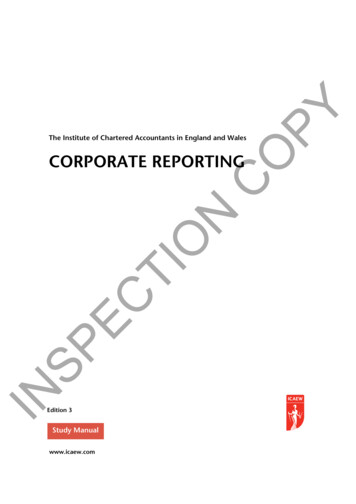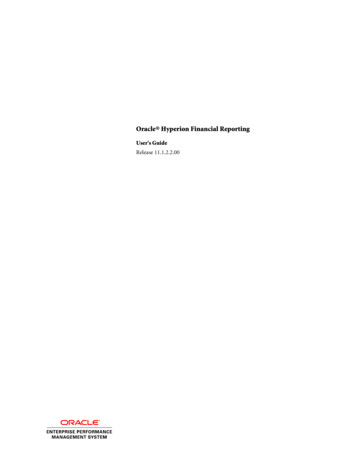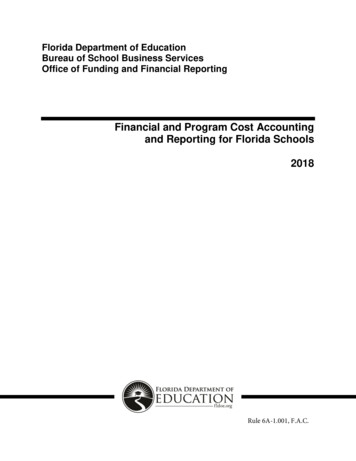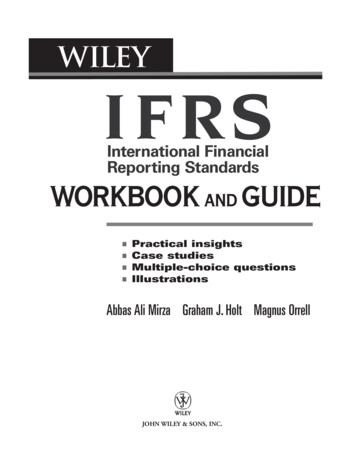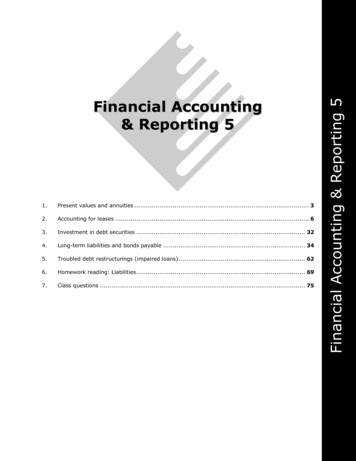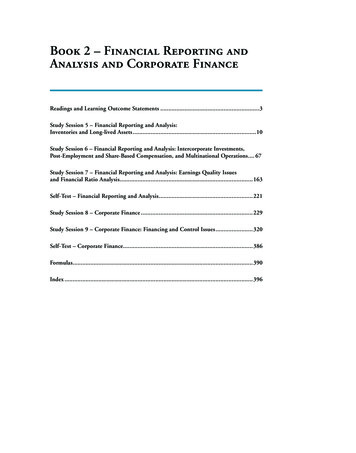
Transcription
European Journal of Business, Economics and AccountancyVol. 4, No. 4, 2016ISSN 2056-6018EFFECT OF INTERNATIONAL FINANCIAL REPORTING STANDARDS (IFRS)ADOPTION ON THE PERFORMANCE OF MONEY DEPOSIT BANKS INNIGERIAGideon Tayo Akinleye (Ph.D)Department of AccountingEkiti State University, Ado-Ekiti, NIGERIAABSTRACTSequel to the injunction mandating Nigerian firms to publish their financial reports inaccordance with the International Financial Reporting Standard (IFRS), Banks in recent timesunavoidably had to adopt standards of accounting based on IFRS framework. The studyemployed ratio analysis to investigate the nexus between IFRS adoption and performance ofmoney deposit banks in the Nigeria. Ten (10) banks out of twenty one quoted banks wererandomly selected for analysis over the period covering 2009 to 2014. Data used in the studywere sourced from the financial statements of the selected banks for the period under study.Panel data analysis in the form of pooled OLS analysis, fixed effect analysis and randomeffect analysis alongside post estimation test such as restricted f-test and Hausman test wereused. The results revealed that adoption of IFRS exert positive impact on performance ofmoney deposit banks measured in terms of return on assets (β 0.9057884, P 0.347) and interms of return on equity (β 0.0655296, P 0.975). The result also revealed that financialratio such as liquidity ratio, current ratio and investment ratio exert significant influence onbank’s performance with reported coefficient estimates and probability values of0.0081876(P 0.009), 0.0001705(P 0.0000), 0.0829368(P 0.000) for liquidity ratio, currentratio, and investment ratio respectively. The study concluded that the impact of IFRSadoption on performance of money deposit banks in Nigeria cannot be undermined. Thestudy recommended that money deposit banks should fully implement international financialreporting standards in order to maximize its influence on their performance, and take closecognizance of financial ratios as their relative impact on performance cannot be undermined.Keywords: International Financial Reporting Standards (IFRS), Performance, MoneyDeposit Banks, Ratio Analysis.INTRODUCTIONThe move towards globalization is a concern for many countries particularly developingcountries as it has the potential of having a deep impact on the economy at large. Theadoption of IFRS as a global and uniform standard is gaining ground as more countries areadopting IFRS or have intentions of adopting the standard. The European Union commencedthe adoption in 2005 by ensuring that all listed companies in the European Union implementIFRS in their financial report (Odia and Ogiedu, 2013). The development of a globallyacceptable standard originally commenced in 1973 as a result of the coming together of agroup of qualified accounting professionals of major countries to form IASC (Internationalaccounting standard committee). These countries are UK, Ireland, United States, Australia,Canada, France, Germany, Japan, Mexico and Netherlands. They focused on developing aglobal accounting standard which will replace local standards, harmonize the differences infinancial report due to diversities in legal systems, business structures and tax systems aroundthe world. Hence, the users of financial information can adequately compare the financialstatements of different companies to evaluate their financial performance and position.Progressive Academic Publishing, UKPage 87www.idpublications.org
European Journal of Business, Economics and AccountancyVol. 4, No. 4, 2016ISSN 2056-6018There has also been some opposition to the adoption of IFRS particularly for developingcountries like Nigeria. It has been argued that Nigeria and many developing countries haveweak institutions, unpredictable economic and political environments which may underminethe successful implementation of IFRS (Tanko, 2012).In their study on the developmentprocess of financial reporting standards around the world and its practical results indeveloping countries, Alp and Ustandag (2009) showed that Turkey experienced lots ofchallenges in the implementation of IFRS. These challenges include the complicated natureof IFRS, difficulties in the application, enforcement issues and possible knowledge shortfall.This research therefore focused on the effect of IFRS On performance of Nigerian banksbefore and after the adoption of IFRS. Key performance indicators in terms of liquidity,profitability, leverage, and asset quality of the selected banks were used to measure the effectof the pre and post adoption of IFRS. Secondary data related to the annual report publishedaccording to IFRS and GAAP for the last six years before and after the adoption were used.Nigerian banks over the years have been observed to exhibit weak disclosures in financialstatement, operational inefficiencies, undercapitalization and a weak corporate governancepractice that impedes their performance and makes it difficult to detect problems easily. Thequality and standard of financial reporting in Nigerian banking sector seems not to match thehigh standard of reporting in the banking sector of more developed countries (Garba, 2013).As a result of this, Nigerian banking industry has undergone numerous reforms. This includesthe increase in the minimum paid in capital of banks from 2billion Naira (US 14m) to 25billion Naira (US 173m). This led to the consolidation of most banks. Other reforms includethe special examination of banks, the move from accounting year to calendar year to improvetransparency and comparability of financial results and the creation of AMCOM (AssetManagement Company) to purchase the non-performing loan from banks.Other reforms were in the form of circulars. Central bank of Nigeria issued a circular on theformat banks were expected to show in their annual financial statements, the maximumnumber of years that a CEO could work was restricted to ten years. Also, the cashless policywas introduced and the convergence to IFRS by the end of 2012 to mention a few. It isnoteworthy that before January 2012, three banks in Nigeria, Access Bank, Guarantee TrustBank and Zenith Bank started preparing and publishing their financial reports according toIFRS. Are there any implications of the adoption of IFRS on the performance of these banks?This study analyzed the effect of IFRS adoption on performance of bank’s performancemeasured in terms of Return on Asset; evaluated the effect of IFRS adoption on performanceof bank’s measured in terms of return on Equity and investigated the relative contribution ofliquidity ratio, investment ratio, and quick-acid ratio on bank’s performance.LITERATURE REVIEWAccounting principles and applicability of IFRSThe IASB has the authority to set IFRSs and to approve interpretations of those standards.IFRSs are intended to be applied by profit-orientated entities. These entities’ financialstatements give information about performance, position and cash flow that is useful to arange of users in making financial decisions. These users include shareholders, creditors,employees and the general public.A complete set of financial statements includes: Statement of financial position, statement ofcomprehensive income, statement of cash flows, description of accounting policies; and notesto the financial statements.Progressive Academic Publishing, UKPage 88www.idpublications.org
European Journal of Business, Economics and AccountancyVol. 4, No. 4, 2016ISSN 2056-6018The concepts underlying accounting practices under IFRS are set out in the IASB’sConceptual Framework for Financial Reporting’ issued in September 2010 (the Framework).It supersedes the ‘Framework for the preparation and presentation of financial statements’(the Framework (1989). The Conceptual Framework covers objectives of general purposefinancial reporting, including information about a reporting entity’s economic resources andclaims, the reporting entity (in the process of being updated)and Qualitative characteristics ofuseful financial information of relevance and faithful representation and the enhancingqualitative characteristics of comparability, verifiability, timeliness and understandability.The remaining text of the 1989 Framework (in the process of being updated), which includes:Underlying assumption, the going concern convention, Elements of financial statements,including financial position (assets, liabilities and equity) and performance (income andexpenses), Recognition of elements, including probability of future benefit, reliability ofmeasurement and recognition of assets, liabilities, income and expenses and Measurement ofelements, including a discussion on historical cost and its alternatives.Major Differences between GAAP and IFRSThe local accounting standard is issued by the Nigerian Accounting Standards Board (NASB)under the NASB Act of 2003. The board ensures the financial statements are prepared andpublished according to the stated format. On the other hand, IFRS is issued by theInternational Accounting Standard Board. The board states how financial items andtransactions are treated and reported in the financial statements.Ratio AnalysisRatio analysis is a commonly used tool of financial statement analysis. Ratio is amathematical relationship between one numbers to another number. Ratio is used as an indexfor evaluating the financial performance of the business concern. An accounting ratio showsthe mathematical relationship between two figures, which have meaningful relation with eachother. Ratio can be classified into various types. Classification from the point of view offinancial management is as follows: Liquidity Ratio, Activity Ratio, Solvency Ratio andProfitability Ratio. But For this study the following ratios will be considered, four keyliquidity ratios, four profitability ratios, three leverage ratios and one asset quality ratio.Okoye and Akenbor (2014) opined that it is expedient for Nigeria to adopt a global standardbecause many Nigerian companies have securities of foreign companies. Hence, IFRS willresult to a better decision about the flow of economic capital. A number of researchers havealso identified the benefit IFRS is deemed to produce. According to Mary, Okoye andAdediran (2013) the adoption of IFRS in Nigeria will open opportunities for a larger financetransformation for firm and upturn the centralization of economies of scale. Okpala (2012) inhis study perceived that IFRS will promote foreign direct investment (FDI) and economicgrowth in Nigeria. Taiwo and Adejare (2014) claimed that IFRS will improve financialperformance, and quality of accounting records. It will also enhance business efficiency, aidresource allocation and performance planning in companies.Leuz, (2013) argued that adopting IFRS alone will not make comparing financial statementso easy because countries are different in their institutional and enforcement mechanism. Inanother study, Terzungwe (2012) stated that IFRS has a broader choice of accounting policythat may be inconsistent with national legislations of Banks and Other Financial InstitutionsAct (BOFIA) and Companies and Allied Matters Act (CAMA). He suggests that NigerianProgressive Academic Publishing, UKPage 89www.idpublications.org
European Journal of Business, Economics and AccountancyVol. 4, No. 4, 2016ISSN 2056-6018Generally Accepted Accounting Principles (GAAP) should remain compulsory for individualcompany’s account of listed companies but made voluntary for group account of non-listedcompanies. This is in line with the adoption of International accounting standards inGermany. In his study, Tanko (2012) revealed empirical studies that showed the adoption ofIFRS do not necessarily result in better accounting quality.Herbert and Tsegba (2013) studied the economic consequence of IFRS adoption in Nigeria.They found that the major setback towards the implementation of IFRS in Nigeria is centeredon limited knowledge and the absence of IFRS in accounting and auditing curriculum. Theyadded that preparers of financial reports lack sufficient experience and understanding with theuse of IFRS. It was posited that before Nigerians adoption of IFRS there should have been anefficient dialogue with renowned stakeholders so as to understand the implication oftransition.METHODModel specificationModel adopted for this study are specified in linear forms below:Where: ROE Return on Equity, ROA Return on asset, LR Liquidity ratio, CR capitalratio (capital/total asset), IR Investment ratio (Net credit facilities / Total deposits),IFRSA international financial reporting standards (Dummy:1 adoption era, 0 non adoptionera)i cross-sectional variable from 1,2, 3, .10t time series variable form 1, 2, 3, 6α0, α1, α2, α3 are parameter estimates corresponding to the explanatory variable and theconstant term, is the cross sectional unit effect, whileis the idiosyncratic error termSources of Data and Methods of EstimationThe study relied heavily on secondary source of data. Secondary data used in the study wassourced from the annual reports and financial statement of the selected banks.The selectedbanks are Diamond bank. First bank; Fidelity bank; First City Monument bank; Skye bank;Stanbic IBTC; Sterling bank; United bank for Africa; Unity bank, and Wema bank Thesebanks were selected because it was discovered that some banks adopted IFRS before itbecame mandatory (period between 2009 and 2011).In the quest to attain the objectivespredetermined in the research work and to provide answers to those research questions raised,the research employed panel data analysis including pooled Ordinary least square estimation,fixed effect estimation, and random effect estimationProgressive Academic Publishing, UKPage 90www.idpublications.org
European Journal of Business, Economics and AccountancyRESULTS AND DISCUSSIONTable 1: Pooled OLS Parameter Estimates Model 1Series: ROA LR CR IR IFRSAVariableCoefficientStandard Error T-Test 4651794.56656430.82R-square 0.9115Adjusted R-square 0.9051F-statistics 141.64Prob(F-stat) 0.0000Table 2: Pooled OLS Parameter Estimates Model 2Series: ROE LR CR IR IFRSAVariableCoefficientStandardT-Test RSA.27232081.2385080.22R-square 0.6270Adjusted R-square 0.6038F-statistics 112.38Prob(F-stat) 0.0004Vol. 4, No. 4, 2016ISSN bility0.0530.4780.3600.7640.827Tables 1 and 2 reported the pooled OLS estimation result for the two models employed in thestudy. From Table 1, it was observed that all the explanatory variables exert positive impacton performance of commercial banks measured in terms of return on asset, with only capitalratio and investment ratio having significant impact on the return on asset. As reported inTable 2 also, all the explanatory variables exerts positive influence on performance of moneydeposit banks measured in terms of return on equity though such impact is not significant.Notably, Table 1 and Table 2 reported R-square of 0.9115, 0.6270 for model 1 and 2respectively, which connotes that about 91% and 63% of the systematic variation inperformance of commercial banks measured in terms of return on asset and return on equitycan be explained by variables including liquidity ratio, capital ratio, investment ratio andadoption of international financial reporting standard.Progressive Academic Publishing, UKPage 91www.idpublications.org
European Journal of Business, Economics and AccountancyTable 3: Fixed Effects Estimate model 1CROSS-SECTIONAL SPECIFIC 40530.592STEARLING1.3286160.261R-square 0.9350Adjusted R-square 0.9166F-statistics 50.90Prob(F-stat) 0.0000Sources: Author’s Computation, (2016)Progressive Academic Publishing, UKTIME SPECIFIC 82R-square 0.9198Adjusted R-square 0.9072F-statistics 73.07Prob(F-stat) 0.0000Table 4: Fixed Effects Estimate model 2CROSS-SECTIONAL SPECIFIC .0831680.685STEARLING2.8743550.282R-square 0.2347Adjusted R-square 0.2184F-statistics 61.09Prob(F-stat) 0.0049Sources: Author’s Computation, (2016)Vol. 4, No. 4, 2016ISSN 2056-6018TIME SPECIFIC -square 0.2427Adjusted R-square 0.2265F-statistics 70.81Prob(F-stat) 0.0070Page 92www.idpublications.org
European Journal of Business, Economics and AccountancyVol. 4, No. 4, 2016ISSN 2056-6018Tables 3 and 4 reported the result of fixed effect estimations (cross sectional specific andperiod specific) for models 1 and 2 respectively. Notably the table reported coefficientestimates corresponding to the explanatory variables alongside cross sectional and periodspecific effect captured by the successive intercept terms. From Tables 3and 4, it can beobserved that adoption of international financial reporting standards exert positive influenceon performance of deposit money banks in Nigeria, measured both in terms of return on assetand return on equity. Also the reported estimate for liquidity ratio, capital ratio, andinvestment ratio for the two models (cross sectional and period specific) revealed thatliquidity ratio, capital ratio, investment ratio exert positive impact on performance of moneydeposit banks in Nigeria, measured both in terms of return on asset and return on equity.Tables 3 and 4 reported an R-square value of 0.9350and 0.9198for cross sectional specificeffect and period specific effect model 1 as well as 0.2347 and 0.2427for cross sectionalspecific effect and period specific effect model 2 respectively.Table 5: Random Effect Estimation Model 1Series: ROA LR CR IR .0045586IFRSA.4651794.5665643R-square 0.9115Wald chi2(5) 566.58Prob chi2 0.0000Z-Test 0000.0000.412Z-Test 980.6910.838Table 6: Random Effect Estimation Model 2Series: ROE LR CR IR 226IR.0039426IFRSA.2456114R-square 0.3262Wald chi2 (5) 41.53Prob chi2 41.203245Tables 5and 6present the random effect estimates for the two models respectively. From thetables it can observed that adoption of international financial reporting standards andfinancial ratio such as liquidity ratio, capital ratio, and investment ratio exert positiveinfluence on performance of commercial banks in Nigeria. Notably the impact of liquidityratio and capital ratio among others tends to be statistically significant.Progressive Academic Publishing, UKPage 93www.idpublications.org
European Journal of Business, Economics and AccountancyVol. 4, No. 4, 2016ISSN 2056-6018Table 7: Restricted F Test of Heterogeneity (Cross-Sectional and Time Specific)F-statisticsProbability0.0850Cross sectional (model 1) 1.8511.310.0090Time specific (model 1)0.2217Cross sectional (model 2) 1.3931.230.000Time specific (model 2)Author’s Computation, (2016)Table 8: Hausman TestNull hypothesisDifference in coefficient not systematic (model 1)Difference in coefficient not systematic (model 2)Author’s Computation, (2016)Chi-square stat212.1143.21Probability0.00000.0051Post estimation test presented in Table 7 and Table 8 revealed that the most consistent andefficient estimation for the two models are the fixed effect period specific effect estimationspresented in Tables 3 and 4 respectively.CONCLUSION AND RECOMMENDATIONSPremised on the findings of the study, it can be concluded that adoption of IFRS has notableinfluence on performance of commercial banks in Nigeria. Also financial ratios such asliquidity and capital ratios have significant influence on the performance of money depositbanks in Nigeria. It is recommended that there should be enlightened campaigns on thepotential impact of adopting IFRS by the regulatory authorities presently in Nigeria. Banksshould endeavour to use the opportunity presented by the adoption of IFRS to improve theirtransactions process and procedures. IFRS should also be included in the Accountingsyllabuses of tertiary institutions and accountancy institutes in Nigeria to enhance massiveeducational training and retraining for students and professionals through continuingprofessional development programmes.REFERENCESAilemen, I., and Akande, A. (2012). International Financial ReportingStandards (IFRS):Benefits, Obstacles and Intrigues for Implementation inNigeria. Research Journal ofFinance and Accounting. 3(10), 143-151.Ajayi, T. and Sosan, M. (2013). The Evolution of Nigeria Banking System,Supervision ttp://ssrn.com/abstract 2286200.Akingunola, R., Adekunle, O., and Adedipe, O. (2013). Corporate Governance and BanksPerformance in Nigeria. (Post-banks consolidation).European Journal of Businessand Social Sciences 2(8).Bala, M. (2013). Effect of IFRS Adoption on the Financial Reports of Nigeria Listed entities:The Case of Oil and Gas Companies. The Macrotheme Review 2(7), 9-26.Barungi, B. (2014). Nigeria. Available at www.africaneconomicoutlook.org.Beke, J. (2011). How can International Accounting Standards Support BusinessManagement? International Journal of Management and Business Research.1(1), 2534.Cormier, D. (2013). The Incidence of Corporate Governance and IFRS onInformationProgressive Academic Publishing, UKPage 94www.idpublications.org
European Journal of Business, Economics and AccountancyVol. 4, No. 4, 2016ISSN 2056-6018Asymmetry and the Value Relevance of Earning: SomeCanadian Evidence. Cashierde Recherche 2014, 01-24.Essien-Akpan, I. (2011). The International Financial Reporting Standards (IFRS). The Roleof the Chartered Secretary and Administrator. A paper presented at the 35thConference of ICSAN. Lagos Sheraton Hotels and Towers. October 26th and 27th.Firoz, M., Ansari.A., and Akhta, K. (2011). IFRS – Impact on Indian Banking Industry.International Journal of Business and Management. 6(3), 277-283.Garba, S. (2013). IFRS and Bank Performance in Nigeria. https://www.academia.edu.Herbert, W., and Tsegba, I. (2013). Economic Consequences of International FinancialReporting Standards (IFRS) Adoption: Evidence from a DevelopingCountry.European journal of Business and Management. 15, 28.Odia, J., and Ogiedu, K. (2013). IFRS Adoption: Issues, Challenges andLessons for Nigeriaand other Adopters. Mediterranean Journal of Social Sciences. 4(3), 389-399.Okoye, P., and Akenbor, C. (2014). Financial Reporting Framework in Nigeria and theAdoption of the IFRS. International Journal of Business and Economic Development2(1), 52- 63.Okpala, K. (2012). Adoption of IFRS and the Financial Statement Effects. The PerceivedImplication on Foreign Direct Investment and Nigeria Economy. Australian Journalof Business and Management Research. 2. 76-83.Pricewater Coopers, (2006). IFRS: The complex issues banks face. Available athttps://www.pwc.com .Taiwo, F., and Adejare, A. (2014). Empirical Analysis of the Effect of International FinancialReporting Standards (IFRS) Adoption on Accounting Practices in Nigeria. Archivesof Business Research, 2(2), 1-14.Tanko, M. (2012). The Effect of IFRS Adoption on the Performance of Firms in Nigeria.Journal of Administrative and Economic Sciences, 5(2), 133-157.Terzungwe, N. (2012). Challenges of Converging to International Financial ReportingStandards (IFRS) in Nigeria. International Journal of Business andInformationTechnology. 2(2), 26-31.Progressive Academic Publishing, UKPage 95www.idpublications.org
Keywords: International Financial Reporting Standards (IFRS), Performance, Money Deposit Banks, Ratio Analysis. INTRODUCTION The move towards globalization is a concern for many countries particularly developing countries as it has the poten


